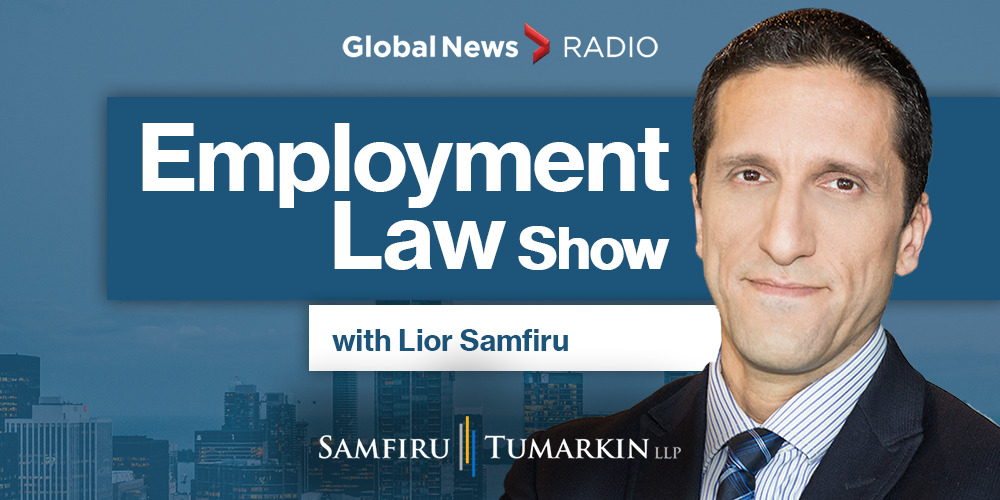Employment Law Show 640 Toronto – S9 E102

Episode Summary
5 things to remember when being recalled from a temporary layoff, new employment contracts, and more on Season 9 Episode 102 of the Employment Law Show on Global News Radio 640 Toronto.
Listen below as Employment Lawyer Lior Samfiru, Partner at Samfiru Tumarkin LLP, reveals your workplace rights in Toronto, the GTA, Hamilton, London, and across Ontario on the Employment Law Show. Lior shatters myths and misconceptions about severance pay, terminations, workplace harassment, overtime pay, wrongful dismissal, constructive dismissal, duty to accommodate, independent contractors, and more.
Listen to the Episode
Episode Notes
I worked for a company for a year and was let go last year during COVID-19. They paid me two weeks’ pay. Is that enough?
Based on the information you provided, you would be owed approximately four months’ pay, not two weeks. Fortunately, it has been less than two years since you were let go, so there is still time to pursue your full severance. Remember the rule, short service employees still get a significant amount of severance.
The company I have worked for 20 years was bought by a new owner three years ago. Now they want all employees to sign a new employment contract, which waives our right to common law severance. What are my options?
This new employment contract tries to eliminate your future severance entitlements. So if you sign that agreement, if you’re ever let go, it could be the difference between you being owed 20 to 24 months’ pay if you don’t sign it, and being owed as little as eight weeks’ pay if you do sign it. This termination clause in the new contract could literally cost you tens of thousands of dollars, if not hundreds of thousands of dollars. Under no circumstances should you sign the new contract. If you refuse to sign it, either they will back off and let you be, or they may decide to let you go. But if they decide to let you go, they’ll have to pay you severance based on your 20 years, which could be up to 24 months’ pay.
LEARN MORE
• Who pays severance when a business is sold in Ontario?
• Sale of business in Alberta: Employee rights
• How does severance work when a B.C. business is sold?
My wife has decided to resign from her job in the middle of January. They want her to resign earlier. Can her employer decide when she resigns?
Remember, a resignation is something she can do voluntarily and unilaterally. Her employer can’t decide when she resigns. It’s only up to her. If they want her gone before January, they are allowed to terminate her, but they would have to pay her until that January date.
Why are employers allowed to require employees to get vaccinated, and if they don’t they have to take a leave of absence?
Look at it this way: if your employer required all employees to drive a BMW, and said they were letting go of all other employees who did not drive a BMW, you not call it criminal – you’d likely say it was just dumb. But if your employer let you go because you didn’t drive a BMW, they would have to pay you severance. Look at the vaccination issue that way – that your employer is trying to impose a term that they’re not allowed to impose, which means if you lose your job because of that they have to pay you severance. It’s not criminal, it’s not extortion, it’s your employer trying to impose a policy that contractually they’re not allowed to do.
LEARN MORE
Can My Employer Mandate the COVID-19 Vaccine?
My employer recently implemented a policy that employees can no longer attend events sponsored by the company. My role at the company includes attending such events. How can they stop me from doing a part of my job?
It comes down to whether your not being able to attend those meetings or events is going to impact your compensation. But if it has an impact where, because of that, you won’t be able to do a certain part of your job, so you won’t be able to get your bonus or you won’t be able to get your commission, then that’s different. That could absolutely be considered a constructive dismissal.
I was a principal at a private school for nine years, and last April the school let me go and gave me four months’ notice and four months of severance. Am I owed more?
Based on the facts you’ve told me you’re probably owed 12 months’ pay. The fact that you were on the contract doesn’t change that because you signed multiple contracts, those contracts become meaningless. They also have to continue your benefits coverage for a period of 12 months starting from April.
My wife has worked at a hospital for one year, and she’s part of a union. Her hospital said that all employees have to be vaccinated or she’ll be let go. What can she do?
The only option that’s available to her as a unionized employee is her union filing a grievance. There are no other options, possibilities, or exceptions to that. If the union files a grievance then they can. One of the things that the grievance would do is prevent her from being terminated, and if she is terminated, she could get her job back with back pay. But the union has to decide to do that. And if they ultimately decide not to, there are no other options available. She cannot hire a lawyer.
My employer is requiring employees to get rapid testing and to take a picture of the result with their phones and send them a link to the photo. Is my employer allowed to require us to use our personal devices for that?
You’re probably right that they can’t ask you to use your personal device, but you have to decide if this is something you want to get into a big argument with your employer about it. I would not pursue a constructive dismissal or legal action. Talk to your employer. Try to convince them. Try to rationalize with them. I think a lot of employers will give you some other options.
My husband works for a municipality, and he has been acting in a management role for a year. He is now being put back into a supervisory role. Does the municipality have the right to reduce his salary and pay him what he was being paid before?
If it was clear that this is only temporary, then his employer is able to take him back to his old terms of employment, his old job, and his old pay. They don’t have to maintain a higher salary. Now if they had simply said put him in a new role and then they changed their mind, they can’t do that. But if it was clear that this is just temporary for a specific purpose or specific period of time, they can do that now.
5 Things to remember when being recalled from a temporary layoff
#1)You have a right to return to a safe workplace
One of the primary responsibilities that an employer has is to ensure a safe work environment. That means making sure that the workplace complies with all government requirements: masking social distancing, and safety equipment. You don’t have to go – and you don’t have an obligation to go – back to the workplace that’s not safe. So, if you know that no one’s wearing masks in the workplace and that people are congregating without masks, that’s an unsafe workplace. That’s a workplace that’s in breach of laws when it comes to safety. You can say no to that, and you can’t be punished for that. You can refuse unsafe work.
If you refuse work, your employer will have to bring in an inspector from the Ministry of Labor to investigate. There are requirements that must be met, like masking and distancing, and your employer has to follow that before they bring you back to work.
LEARN MORE
Your Right to Refuse Unsafe Work During the Coronavirus Outbreak
#2)You have the right to the same pay hours of working job you had before the layoff
An employer does not have a right to make significant changes to terms of employment. Your employer can’t reduce your pay, can’t put you on the evening shift if you’re working the day shift, can’t demote you, and can’t make you go part-time if you’re a full-time employee.
When coming back from a temporary layoff, you have a right to the same terms of employment. And if your employer says we will take you back, but only on different terms, that’s a constructive dismissal. They’re not allowed to make those changes.
If you do accept different terms of employment, you will have opened the door to this happening again. You’ve given them the right to do it again.
#3)You do not have to sign a new employment contract if you’re coming back
There’s no rationale for you having or needing to sign a new employment contract when coming back from a temporary layoff. The only time your employer is going to want you to or ask you to sign a new employment agreement is if that employment agreement provides for much better terms for your employer, not for you. So, you should always be wary of being presented with a new employment agreement. That agreement could limit your future severance. So, tell your employer you don’t need to sign a new employment agreement.
#4)Your seniority does not start back at zero
If you’re coming back from a temporary layoff, you’re coming back to continue your seniority. In fact, the time you spent on that temporary layoff counts towards your seniority. It’s especially important when it comes to future severance. If you come back from a temporary layoff and then you let go, your sentence is going to be calculated based on your total years. It doesn’t start at zero on the day you come back from a layoff. So if you are ever let go, the time that you spent on temporary layoff counts towards your seniority, and that’s important when it comes to your severance.
LEARN MORE
If I have more seniority at a company, should I be asked back to work first?
#5)If you aren’t recalled back to work, you are owed severance pay
If you’re not recalled then you’re going to be old severance. Your employer can’t get around paying you severance by saying we put you on a temporary layoff. If you’re not back at work, you have to get paid. Either you wait and see what happens or you can choose to treat that layoff as a termination now. If you’ve been on the layoff for a while, you want to reach out to my firm sooner rather than later.
#6)You need a good reason in order to refuse to go back to work
If you’re being recalled back to work and you’re not going to go, there has to be a reason and that reason has to be something concrete. You can’t say you’re not feeling safe. That’s not good enough. Unless there’s a good reason for you not to return to work, that could be considered a resignation. If you’re not sure what to do, contact our firm for help.




